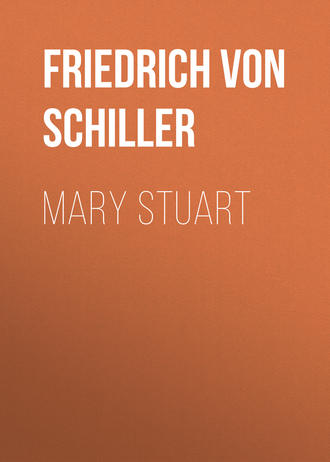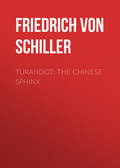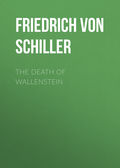
Фридрих Шиллер
Mary Stuart
SCENE VIII
BURLEIGH, PAULET.
BURLEIGH
She scorns us, she defies us! will defy us,
Even at the scaffold's foot. This haughty heart
Is not to be subdued. Say, did the sentence
Surprise her? Did you see her shed one tear,
Or even change her color? She disdains
To make appeal to our compassion. Well
She knows the wavering mind of England's queen.
Our apprehensions make her bold.
PAULET
My lord,
Take the pretext away which buoys it up,
And you shall see this proud defiance fail
That very moment. I must say, my lord,
Irregularities have been allowed
In these proceedings; Babington and Ballard
Should have been brought, with her two secretaries,
Before her, face to face.
BURLEIGH
No, Paulet, no.
That was not to be risked; her influence
Upon the human heart is too supreme;
Too strong the female empire of her tears.
Her secretary, Curl, if brought before her,
And called upon to speak the weighty word
On which her life depends, would straight shrink back
And fearfully revoke his own confession.
PAULET
Then England's enemies will fill the world
With evil rumors; and the formal pomp
Of these proceedings to the minds of all
Will only signalize an act of outrage.
BURLEIGH
That is the greatest torment of our queen,
[That she can never 'scape the blame. Oh God!]
Had but this lovely mischief died before
She set her faithless foot on English ground.
PAULET
Amen, say I!
BURLEIGH
Had sickness but consumed her!
PAULET
England had been secured from such misfortune.
BURLEIGH
And yet, if she had died in nature's course,
The world would still have called us murderers.
PAULET
'Tis true, the world will think, despite of us,
Whate'er it list.
BURLEIGH
Yet could it not be proved?
And it would make less noise.
PAULET
Why, let it make
What noise it may. It is not clamorous blame,
'Tis righteous censure only which can wound.
BURLEIGH
We know that holy justice cannot 'scape
The voice of censure; and the public cry
Is ever on the side of the unhappy:
Envy pursues the laurelled conqueror;
The sword of justice, which adorns the man,
Is hateful in a woman's hand; the world
Will give no credit to a woman's justice
If woman be the victim. Vain that we,
The judges, spoke what conscience dictated;
She has the royal privilege of mercy;
She must exert it: 'twere not to be borne,
Should she let justice take its full career.
PAULET
And therefore —
BURLEIGH
Therefore should she live? Oh, no,
She must not live; it must not be. 'Tis this,
Even this, my friend, which so disturbs the queen,
And scares all slumber from her couch; I read
Her soul's distracting contest in her eyes:
She fears to speak her wishes, yet her looks,
Her silent looks, significantly ask,
"Is there not one amongst my many servants
To save me from this sad alternative?
Either to tremble in eternal fear
Upon my throne, or else to sacrifice
A queen of my own kindred on the block?"
PAULET
'Tis even so; nor can it be avoided —
BURLEIGH
Well might it be avoided, thinks the queen,
If she had only more attentive servants.
PAULET
How more attentive?
BURLEIGH
Such as could interpret
A silent mandate.
PAULET
What? A silent mandate!
BURLEIGH
Who, when a poisonous adder is delivered
Into their hands, would keep the treacherous charge
As if it were a sacred, precious jewel?
PAULET
A precious jewel is the queen's good name
And spotless reputation: good my lord,
One cannot guard it with sufficient care.
BURLEIGH
When out of Shrewsbury's hands the Queen of Scots
Was trusted to Sir Amias Paulet's care,
The meaning was —
PAULET
I hope to God, my lord,
The meaning was to give the weightiest charge
Into the purest hands; my lord, my lord!
By heaven I had disdained this bailiff's office
Had I not thought the service claimed the care
Of the best man that England's realm can boast.
Let me not think I am indebted for it
To anything but my unblemished name.
BURLEIGH
Spread the report she wastes; grows sicker still
And sicker; and expires at last in peace;
Thus will she perish in the world's remembrance,
And your good name is pure.
PAULET
But not my conscience.
BURLEIGH
Though you refuse us, sir, your own assistance,
You will not sure prevent another's hand.
PAULET
No murderer's foot shall e'er approach her threshold
Whilst she's protected by my household gods.
Her life's a sacred trust; to me the head
Of Queen Elizabeth is not more sacred.
Ye are the judges; judge, and break the staff;
And when 'tis time then let the carpenter
With axe and saw appear to build the scaffold.
My castle's portals shall be open to him,
The sheriff and the executioners:
Till then she is intrusted to my care;
And be assured I will fulfil my trust,
She shall nor do nor suffer what's unjust.
[Exeunt
ACT II
SCENE I
London, a Hall in the Palace of Westminster. The EARL OF KENT and SIR WILLIAM DAVISON meeting.
DAVISON
Is that my Lord of Kent? So soon returned?
Is then the tourney, the carousal over?
KENT
How now? Were you not present at the tilt?
DAVISON
My office kept me here.
KENT
Believe me, sir,
You've lost the fairest show which ever state
Devised, or graceful dignity performed:
For beauty's virgin fortress was presented
As by desire invested; the Earl-Marshal,
The Lord-High Admiral, and ten other knights
Belonging to the queen defended it,
And France's cavaliers led the attack.
A herald marched before the gallant troop,
And summoned, in a madrigal, the fortress;
And from the walls the chancellor replied;
And then the artillery was played, and nosegays
Breathing delicious fragrance were discharged
From neat field-pieces; but in vain, the storm
Was valiantly resisted, and desire
Was forced, unwillingly, to raise the siege.
DAVISON
A sign of evil-boding, good my lord,
For the French Suitors.
KENT
Why, you know that this
Was but in sport; when the attack's in earnest
The fortress will, no doubt, capitulate.
DAVISON
Ha! think you so? I never can believe it.
KENT
The hardest article of all is now
Adjusted and acceded to by France;
The Duke of Anjou is content to hold
His holy worship in a private chapel;
And openly he promises to honor
And to protect the realm's established faith.
Had ye but heard the people's joyful shouts
Where'er the tidings spread, for it has been
The country's constant fear the queen might die
Without immediate issue of her body;
And England bear again the Romish chains
If Mary Stuart should ascend the throne.
DAVISON
This fear appears superfluous; she goes
Into the bridal chamber; Mary Stuart
Enters the gates of death.
KENT
The queen approaches.
SCENE II
Enter ELIZABETH, led in by LEICESTER, COUNT AUBESPINE, BELLIEVRE, LORDS SHREWSBURY and BURLEIGH, with other French and English gentlemen.
ELIZABETH (to AUBESPINE)
Count, I am sorry for these noblemen
Whose gallant zeal hath brought them over sea
To visit these our shores, that they, with us,
Must miss the splendor of St. Germain's court.
Such pompous festivals of godlike state
I cannot furnish as the royal court
Of France. A sober and contented people,
Which crowd around me with a thousand blessings
Whene'er in public I present myself:
This is the spectacle which I can show,
And not without some pride, to foreign eyes.
The splendor of the noble dames who bloom
In Catherine's beauteous garden would, I know,
Eclipse myself, and my more modest merits.
AUBESPINE
The court of England has one lady only
To show the wondering foreigner; but all
That charms our hearts in the accomplished sex
Is seen united in her single person.
BELLIEVRE
Great majesty of England, suffer us
To take our leave, and to our royal master,
The Duke of Anjou, bring the happy news.
The hot impatience of his heart would not
Permit him to remain at Paris; he
At Amiens awaits the joyful tidings;
And thence to Calais reach his posts to bring
With winged swiftness to his tranced ear
The sweet consent which, still we humbly hope,
Your royal lips will graciously pronounce.
ELIZABETH
Press me no further now, Count Bellievre.
It is not now a time, I must repeat,
To kindle here the joyful marriage torch.
The heavens lower black and heavy o'er this land;
And weeds of mourning would become me better
Than the magnificence of bridal robes.
A fatal blow is aimed against my heart;
A blow which threatens to oppress my house.
BELLIEVRE
We only ask your majesty to promise
Your royal hand when brighter days shall come.
ELIZABETH
Monarchs are but the slaves of their condition;
They dare not hear the dictates of their hearts;
My wish was ever to remain unmarried,
And I had placed my greatest pride in this,
That men hereafter on my tomb might read,
"Here rests the virgin queen." But my good subjects
Are not content that this should be: they think,
E'en now they often think upon the time
When I shall be no more. 'Tis not enough
That blessings now are showered upon this land;
They ask a sacrifice for future welfare,
And I must offer up my liberty,
My virgin liberty, my greatest good,
To satisfy my people. Thus they'd force
A lord and master on me. 'Tis by this
I see that I am nothing but a woman
In their regard; and yet methought that I
Had governed like a man, and like a king.
Well wot I that it is not serving God
To quit the laws of nature; and that those
Who here have ruled before me merit praise,
That they have oped the cloister gates, and given
Thousands of victims of ill-taught devotion
Back to the duties of humanity.
But yet a queen who hath not spent her days
In fruitless, idle contemplation; who,
Without murmur, indefatigably
Performs the hardest of all duties; she
Should be exempted from that natural law
Which doth ordain one half of human kind
Shall ever be subservient to the other.
AUBESPINE
Great queen, you have upon your throne done honor
To every virtue; nothing now remains
But to the sex, whose greatest boast you are
To be the leading star, and give the great
Example of its most consistent duties.
'Tis true, the man exists not who deserves
That you to him should sacrifice your freedom;
Yet if a hero's soul, descent, and rank,
And manly beauty can make mortal man
Deserving of this honor —
ELIZABETH
Without doubt,
My lord ambassador, a marriage union
With France's royal son would do me honor;
Yes, I acknowledge it without disguise,
If it must be, if I cannot prevent it,
If I must yield unto my people's prayers,
And much I fear they will o'erpower me,
I do not know in Europe any prince
To whom with less reluctance I would yield
My greatest treasure, my dear liberty.
Let this confession satisfy your master.
BELLIEVRE
It gives the fairest hope, and yet it gives
Nothing but hope; my master wishes more.
ELIZABETH
What wishes he?
[She takes a ring from her finger, and thoughtfully examines it.
In this a queen has not
One privilege above all other women.
This common token marks one common duty,
One common servitude; the ring denotes
Marriage, and 'tis of rings a chain is formed.
Convey this present to his highness; 'tis
As yet no chain, it binds me not as yet,
But out of it may grow a link to bind me.
BELLIEVRE (kneeling)
This present, in his name, upon my knees,
I do receive, great queen, and press the kiss
Of homage on the hand of her who is
Henceforth my princess.
ELIZABETH (to the EARL OF LEICESTER, whom she, during the last speeches, had continually regarded)
By your leave, my lord.
[She takes the blue ribbon from his neck [1], and invests Bellievre
with it.
Invest his highness with this ornament,
As I invest you with it, and receive you
Into the duties of my gallant order.
And, "Honi soit qui mal y pense." Thus perish
All jealousy between our several realms,
And let the bond of confidence unite
Henceforth, the crowns of Britain and of France.
BELLIEVRE
Most sovereign queen, this is a day of joy;
Oh that it could be so for all, and no
Afflicted heart within this island mourn.
See! mercy beams upon thy radiant brow;
Let the reflection of its cheering light
Fall on a wretched princess, who concerns
Britain and France alike.
ELIZABETH
No further, count!
Let us not mix two inconsistent things;
If France be truly anxious for my hand,
It must partake my interests, and renounce
Alliance with my foes.
AUBESPINE
In thine own eyes
Would she not seem to act unworthily,
If in this joyous treaty she forgot
This hapless queen, the widow of her king;
In whose behalf her honor and her faith
Are bound to plead for grace.
ELIZABETH
Thus urged, I know
To rate this intercession at its worth;
France has discharged her duties as a friend,
I will fulfil my own as England's queen.
[She bows to the French ambassadors, who, with the other gentlemen, retire respectfully.
[Till the time of Charles the First, the Knights of the Garter wore the blue ribbon with the George about their necks, as they still do the collars, on great days. – TRANSLATOR.]
SCENE III
Enter BURLEIGH, LEICESTER, and TALBOT.
The QUEEN takes her seat.
BURLEIGH
Illustrious sovereign, thou crown'st to-day
The fervent wishes of thy people; now
We can rejoice in the propitious days
Which thou bestowest upon us; and we look
No more with fear and trembling towards the time
Which, charged with storms, futurity presented.
Now, but one only care disturbs this land;
It is a sacrifice which every voice
Demands; Oh! grant but this and England's peace
Will be established now and evermore.
ELIZABETH
What wish they still, my lord? Speak.
BURLEIGH
They demand
The Stuart's head. If to thy people thou
Wouldst now secure the precious boon of freedom,
And the fair light of truth so dearly won,
Then she must die; if we are not to live
In endless terror for thy precious life
The enemy must fall; for well thou know'st
That all thy Britons are not true alike;
Romish idolatry has still its friends
In secret, in this island, who foment
The hatred of our enemies. Their hearts
All turn toward this Stuart; they are leagued
With the two plotting brothers of Lorrain,
The foes inveterate of thy house and name.
'Gainst thee this raging faction hath declared
A war of desolation, which they wage
With the deceitful instruments of hell.
At Rheims, the cardinal archbishop's see,
There is the arsenal from which they dart
These lightnings; there the school of regicide;
Thence, in a thousand shapes disguised, are sent
Their secret missionaries to this isle;
Their bold and daring zealots; for from thence
Have we not seen the third assassin come?
And inexhausted is the direful breed
Of secret enemies in this abyss.
While in her castle sits at Fotheringay,
The Ate1 of this everlasting war,
Who, with the torch of love, spreads flames around;
For her who sheds delusive hopes on all,
Youth dedicates itself to certain death;
To set her free is the pretence – the aim
Is to establish her upon the throne.
For this accursed House of Guise denies
Thy sacred right; and in their mouths thou art
A robber of the throne, whom chance has crowned.
By them this thoughtless woman was deluded,
Proudly to style herself the Queen of England;
No peace can be with her, and with her house;
[Their hatred is too bloody, and their crimes
Too great;] thou must resolve to strike, or suffer —
Her life is death to thee, her death thy life.
ELIZABETH
My lord, you bear a melancholy office;
I know the purity which guides your zeal,
The solid wisdom which informs your speech;
And yet I hate this wisdom, when it calls
For blood, I hate it in my inmost soul.
Think of a milder counsel – Good my Lord
Of Shrewsbury, we crave your judgment here.
TALBOT
[Desire you but to know, most gracious queen,
What is for your advantage, I can add
Nothing to what my lord high-treasurer
Has urged; then, for your welfare, let the sentence
Be now confirmed – this much is proved already:
There is no surer method to avert
The danger from your head and from the state.
Should you in this reject our true advice,
You can dismiss your council. We are placed
Here as your counsellors, but to consult
The welfare of this land, and with our knowledge
And our experience we are bound to serve you!
But in what's good and just, most gracious queen,
You have no need of counsellors, your conscience
Knows it full well, and it is written there.
Nay, it were overstepping our commission
If we attempted to instruct you in it.
ELIZABETH
Yet speak, my worthy Lord of Shrewsbury,
'Tis not our understanding fails alone,
Our heart too feels it wants some sage advice.]
TALBOT
Well did you praise the upright zeal which fires
Lord Burleigh's loyal breast; my bosom, too,
Although my tongue be not so eloquent,
Beats with no weaker, no less faithful pulse.
Long may you live, my queen, to be the joy
Of your delighted people, to prolong
Peace and its envied blessings in this realm.
Ne'er hath this isle beheld such happy days
Since it was governed by its native kings.
Oh, let it never buy its happiness
With its good name; at least, may Talbot's eyes
Be closed in death e'er this shall come to pass.
ELIZABETH
Forbid it, heaven, that our good name be stained!
TALBOT
Then must you find some other way than this
To save thy kingdom, for the sentence passed
Of death against the Stuart is unjust.
You cannot upon her pronounce a sentence
Who is not subject to you.
ELIZABETH
Then, it seems,
My council and my parliament have erred;
Each bench of justice in the land is wrong,
Which did with one accord admit this right.
TALBOT (after a pause)
The proof of justice lies not in the voice
Of numbers; England's not the world, nor is
Thy parliament the focus, which collects
The vast opinion of the human race.
This present England is no more the future
Than 'tis the past; as inclination changes,
Thus ever ebbs and flows the unstable tide
Of public judgment. Say not, then, that thou
Must act as stern necessity compels,
That thou must yield to the importunate
Petitions of thy people; every hour
Thou canst experience that thy will is free.
Make trial, and declare thou hatest blood,
And that thou wilt protect thy sister's life;
Show those who wish to give thee other counsels,
That here thy royal anger is not feigned,
And thou shalt see how stern necessity
Can vanish, and what once was titled justice
Into injustice be converted: thou
Thyself must pass the sentence, thou alone
Trust not to this unsteady, trembling reed,
But hear the gracious dictates of thy heart.
God hath not planted rigor in the frame
Of woman; and the founders of this realm,
Who to the female hand have not denied
The reins of government, intend by this
To show that mercy, not severity,
Is the best virtue to adorn a crown.
ELIZABETH
Lord Shrewsbury is a fervent advocate
For mine and England's enemy; I must
Prefer those counsellors who wish my welfare.
TALBOT
Her advocates have an invidious task!
None will, by speaking in her favor, dare
To meet thy anger: stiffer, then, an old
And faithful counsellor (whom naught on earth
Can tempt on the grave's brink) to exercise
The pious duty of humanity.
It never shall be said that, in thy council,
Passion and interest could find a tongue,
While mercy's pleading voice alone was mute,
All circumstances have conspired against her;
Thou ne'er hast seen her face, and nothing speaks
Within thy breast for one that's stranger to thee.
I do not take the part of her misdeeds;
They say 'twas she who planned her husband's murder:
'Tis true that she espoused his murderer.
A grievous crime, no doubt; but then it happened
In darksome days of trouble and dismay,
In the stern agony of civil war,
When she, a woman, helpless and hemmed in
By a rude crowd of rebel vassals, sought
Protection in a powerful chieftain's arms.
God knows what arts were used to overcome her!
For woman is a weak and fragile thing.
ELIZABETH
Woman's not weak; there are heroic souls
Among the sex; and, in my presence, sir,
I do forbid to speak of woman's weakness.
TALBOT
Misfortune was for thee a rigid school;
Thou wast not stationed on the sunny side
Of life; thou sawest no throne, from far, before thee;
The grave was gaping for thee at thy feet.
At Woodstock, and in London's gloomy tower,
'Twas there the gracious father of this land
Taught thee to know thy duty, by misfortune.
No flatterer sought thee there: there learned thy soul,
Far from the noisy world and its distractions,
To commune with itself, to think apart,
And estimate the real goods of life.
No God protected this poor sufferer:
Transplanted in her early youth to France,
The court of levity and thoughtless joys,
There, in the round of constant dissipation,
She never heard the earnest voice of truth;
She was deluded by the glare of vice,
And driven onward by the stream of ruin.
Hers was the vain possession of a face,
And she outshone all others of her sex
As far in beauty, as in noble birth.
ELIZABETH
Collect yourself, my Lord of Shrewsbury;
Bethink you we are met in solemn council.
Those charms must surely be without compare,
Which can engender, in an elder's blood,
Such fire. My Lord of Leicester, you alone
Are silent; does the subject which has made
Him eloquent, deprive you of your speech?
LEICESTER
Amazement ties my tongue, my queen, to think
That they should fill thy soul with such alarms,
And that the idle tales, which, in the streets,
Of London, terrify the people's ears,
Should reach the enlightened circle of thy council,
And gravely occupy our statesmen's minds.
Astonishment possesses me, I own,
To think this lackland Queen of Scotland, she
Who could not save her own poor throne, the jest
Of her own vassals, and her country's refuse,
[Who in her fairest days of freedom, was
But thy despised puppet,] should become
At once thy terror when a prisoner.
What, in Heaven's name, can make her formidable?
That she lays claim to England? that the Guises
Will not acknowledge thee as queen?
[Did then Thy people's loyal fealty await
These Guises' approbation?] Can these Guises,
With their objections, ever shake the right
Which birth hath given thee; which, with one consent,
The votes of parliament have ratified?
And is not she, by Henry's will, passed o'er
In silence? Is it probable that England,
As yet so blessed in the new light's enjoyment,
Should throw itself into this papist's arms?
From thee, the sovereign it adores, desert
To Darnley's murderess? What will they then,
These restless men, who even in thy lifetime
Torment thee with a successor; who cannot
Dispose of thee in marriage soon enough
To rescue church and state from fancied peril?
Stand'st thou not blooming there in youthful prime
While each step leads her towards the expecting tomb?
By Heavens, I hope thou wilt full many a year
Walk o'er the Stuart's grave, and ne'er become
Thyself the instrument of her sad end.
BURLEIGH
Lord Leicester hath not always held this tone.
LEICESTER
'Tis true, I in the court of justice gave
My verdict for her death; here, in the council,
I may consistently speak otherwise
Here, right is not the question, but advantage.
Is this a time to fear her power, when France,
Her only succor, has abandoned her?
When thou preparest with thy hand to bless
The royal son of France, when the fair hope
Of a new, glorious stem of sovereigns
Begins again to blossom in this land?
Why hasten then her death? She's dead already.
Contempt and scorn are death to her; take heed
Lest ill-timed pity call her into life.
'Tis therefore my advice to leave the sentence,
By which her life is forfeit, in full force.
Let her live on; but let her live beneath
The headsman's axe, and, from the very hour
One arm is lifted for her, let it fall.
ELIZABETH (rises)
My lords, I now have heard your several thoughts,
And give my ardent thanks for this your zeal.
With God's assistance, who the hearts of kings
Illumines, I will weigh your arguments,
And choose what best my judgment shall approve.
[To BURLEIGH.
[Lord Burleigh's honest fears, I know it well,
Are but the offspring of his faithful care;
But yet, Lord Leicester has most truly said,
There is no need of haste; our enemy
Hath lost already her most dangerous sting —
The mighty arm of France: the fear that she
Might quickly be the victim of their zeal
Will curb the blind impatience of her friends.]







